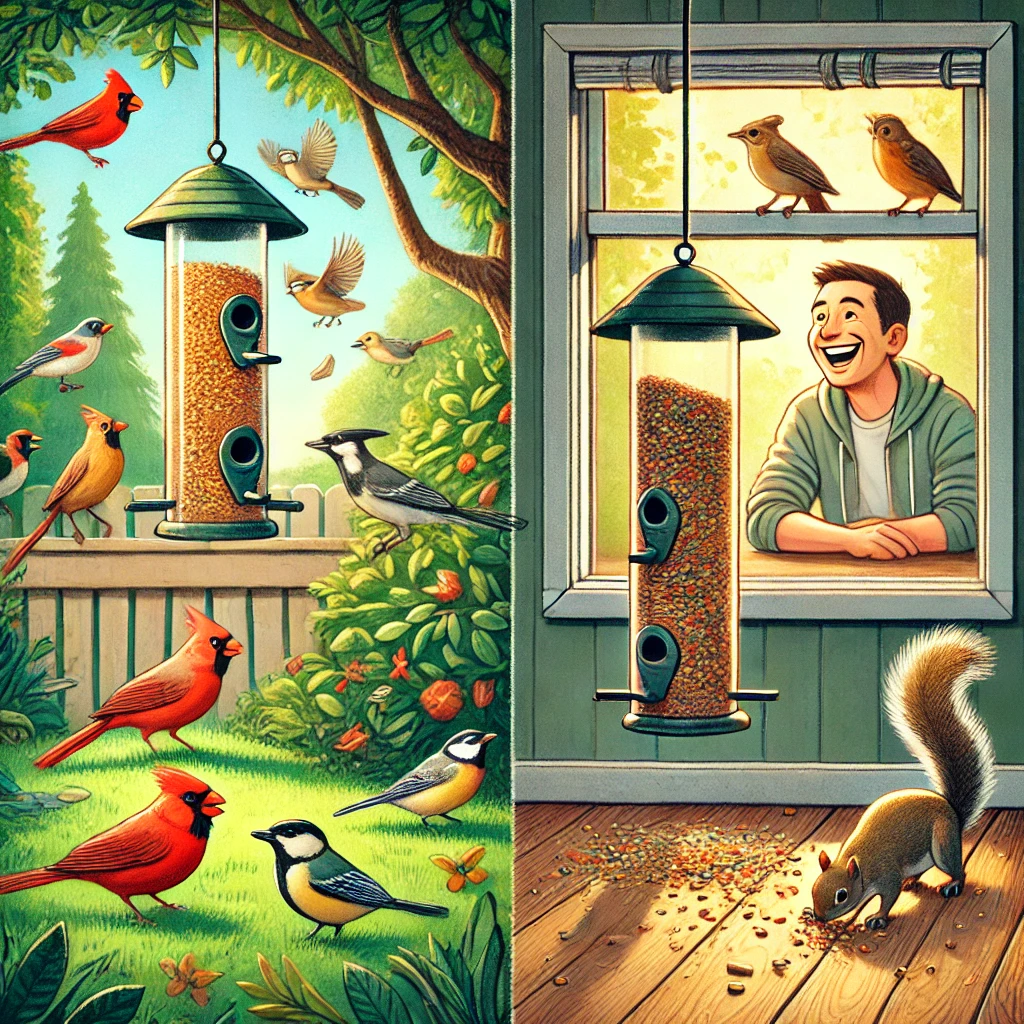Bird feeding is a delightful activity enjoyed by millions worldwide. Not only does it offer a chance to observe nature up close, but it also plays a role in supporting local bird populations. However, like any activity involving wildlife, it has its advantages and disadvantages. Below, we explore the benefits, challenges, remedies, and common questions surrounding bird feeding in greater detail.
The Benefits of Bird Feeding
1. Support for Local Bird Populations
Bird feeding provides a reliable food source, especially during harsh winters, droughts, or food shortages. This additional food can improve survival rates for many species, particularly migratory birds or those struggling to adapt to urbanization.
2. Educational Opportunities
Watching and identifying birds fosters curiosity and provides valuable insights into wildlife behavior, ecosystems, and biodiversity. It’s an engaging way for families and schools to teach environmental awareness and the importance of conservation.
3. Stress Reduction and Mental Well-being
Spending time observing birds in your backyard or local park can be incredibly therapeutic. Studies have shown that connecting with nature reduces stress, anxiety, and depression. Birdwatching offers a sense of mindfulness and can even improve focus and creativity.
4. Increased Biodiversity in Urban Areas
By feeding birds, urban dwellers can attract a wider variety of species to their neighborhoods. This not only enhances local biodiversity but also helps create microhabitats that support the broader ecosystem, including pollinators and beneficial insects.
5. Pest Control
Birds such as sparrows, chickadees, and woodpeckers consume insects, providing natural pest control. Encouraging these species can help protect gardens and crops without the need for chemical pesticides.
6. Community Building
Bird feeding can foster community connections, as neighbors share sightings and tips or participate in local birdwatching events and citizen science projects.
The Drawbacks of Bird Feeding
1. Dependency on Artificial Food Sources
Over-reliance on feeders may cause some birds to lose their foraging instincts, making them vulnerable if food sources are suddenly removed.
2. Spread of Disease
Feeders that are not cleaned regularly can harbor bacteria, fungi, and viruses, facilitating the spread of diseases such as salmonellosis, avian pox, and conjunctivitis among birds.
3. Attraction of Predators and Pests
Feeders can inadvertently attract unwanted visitors like squirrels, rats, raccoons, or even domestic cats, which may prey on birds or consume large amounts of food.
4. Nutritional Imbalance
Some birdseed mixes are low in nutritional value or contain filler ingredients that birds don’t need, such as dyed millet or cracked corn, which can negatively impact their health.
5. Environmental Impact
Improperly disposed of seed husks, plastic feeders, or spilled birdseed can contribute to litter, pollution, and habitat degradation.
Remedies to Overcome the Challenges
1. Prevent Dependency
- Provide food during the most challenging seasons (e.g., winter or droughts) and reduce feeding during times of natural abundance.
- Incorporate native plants, shrubs, and trees in your yard to create a natural habitat that provides food, shelter, and nesting opportunities.
2. Maintain Clean Feeders
- Clean feeders at least once a week using a solution of one part bleach to nine parts water, and allow them to dry thoroughly before refilling.
- Ensure birdbaths and feeding areas are free from algae, mold, and debris.
3. Deter Predators and Pests
- Use squirrel-proof feeders or install baffles to deter non-bird species.
- Position feeders away from dense shrubs where predators like cats can hide.
- Regularly clean the ground beneath feeders to remove fallen seeds that attract rodents.
4. Provide a Balanced Diet
- Offer high-quality birdseed blends that include black-oil sunflower seeds, nyjer seed, and peanuts. Supplement with suet, mealworms, and nectar as appropriate for local species.
- Avoid feeding bread, salty snacks, or spoiled food, which can be harmful to birds.
5. Reduce Environmental Impact
- Choose feeders made from durable, eco-friendly materials like wood or metal.
- Compost seed husks and spilled food to minimize waste and support soil health.
- Recycle packaging and avoid plastic where possible.
Conclusion
Bird feeding offers numerous benefits for both birds and bird enthusiasts, fostering a deeper connection to nature and contributing to wildlife conservation. By addressing potential challenges and adopting responsible practices, you can create a safe, enjoyable, and sustainable feeding environment. Whether you’re a seasoned bird watcher or a beginner, feeding birds is a rewarding way to support your local ecosystem and nurture a love for the natural world.
FAQs About Bird Feeding
1. When is the best time to feed birds?
Birds can benefit from supplemental feeding year-round, but the most critical periods are late winter and early spring when natural food is scarce, and during extreme weather conditions.
2. What is the best type of bird food?
The ideal food depends on the species in your area. Black-oil sunflower seeds are a favorite for many birds, while nyjer seed attracts finches. Suet is excellent for woodpeckers, and mealworms are popular with insectivorous species.
3. Can feeding birds harm them?
Feeding birds improperly or irresponsibly can harm them. Always provide appropriate, fresh food, clean feeders regularly, and ensure feeding areas are safe from predators.
4. How do I attract more birds to my feeder?
Place feeders in quiet, sheltered locations with nearby trees or bushes for cover. Provide fresh water for drinking and bathing, and use a variety of food types to cater to different species.
5. Is it okay to stop feeding birds abruptly?
If you decide to stop feeding birds, it’s best to do so gradually during times of natural abundance to allow them to adjust and find alternative food sources.
6. What other benefits does bird feeding offer?
Beyond supporting birds, feeding activities can inspire community science projects, photography hobbies, and increased environmental awareness, enriching lives in unexpected ways.


1 comment
But wanna state that this is very helpful, Thanks for taking your time to write this.